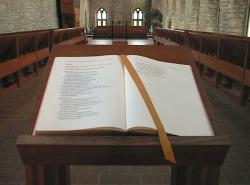A PREVIOUS post, The Novus Ordo and Corpus Christi “Lite,” noted that the new lectionary (cycle of scripture readings) for the Mass of Paul VI omitted a scripture passage which appeared in the old Missal, apparently because the passage was at odds with various tenets of modernist theology.
Needless to say, the reformers couldn’t possibly have omitted every such passage from the lectionary, otherwise there would have been little left to read. How, then, did they proceed? The Introduction to the new lectionary lays down the principles:
• Scripture passages that are “truly difficult,” which present “serious literary, critical or exegetical problems” or which the faithful “may find too difficult to understand” are not employed on Sundays.
• In certain passages appointed to be read to the people, individual verses have occasionally been omitted, since they were deemed to be “of little pastoral worth, or involving truly difficult questions.”
• In some cases, individual verses in a reading are optional; in others, an entirely different reading may be substituted. “Pastoral reasons” and the ability of the people “to understand difficult texts correctly” will determine which option the priest chooses. (See Work of Human Hands, 265)
One such “difficult” passage occurs in the Gospel in the traditional Missal for tomorrow, the Fifth Sunday after Pentecost:
At that time Jesus said to His disciples: Except your justice abound more than that of the Scribes and Pharisees, you shall not enter into the kingdom of heaven. You have heard that it was said to them of old: Thou shalt not kill; and whosoever shall kill, shall be in danger of the judgment. But I say to you, that whosoever is angry with his brother, shall be in danger of the judgment; and whosoever shall say to his brother: Raca, shall be in danger of the council; and whosoever shall say: Thou fool, shall be in danger of hell fire. If therefore thou offer thy gift at the altar, and there thou remember that thy brother hath anything against thee, leave there thy offering before the altar, and go first to be reconciled to thy brother; and then coming thou shalt offer thy gift. (Mt 5:20–25)
The difficult bit for the modernist, of course, is the line in bold: “whosoever shall say: Thou fool, shall be in danger of hell fire.”
Thus, while the passage we have quoted above does indeed appear in the new lectionary for the Sixth Sunday of the Year in Year A (Lectionary §77), it is in a “long form” of the reading, for which an alternate and optional “short form” is provided. The latter omits the offending phrase.
So, take your pick: the hell or the non-hell option.
This is but one example in the new lectionary of how the men who promised us “more scripture” gave us less of its message. For other examples, see Work of Human Hands, 265–72.
The fate of Postcommunion prayer in the traditional Missal for the Fifth Sunday after Pentecost is also of interest:
Grant, O Lord, we beseech Thee, that we whom Thou hast fed with the heavenly Gift, may be cleansed from our hidden sins and delivered from the snares of our enemies.
More “negative” theology — and even worse, the last few words could be construed as referring to the devil!
So, in the Missal of Paul VI the prayer has been entirely suppressed.
Lex orandi, lex credendi.

13 Comments